Interviews: 2018 Nobel Prize in Physiology or Medicine - Immunotherapy
Immuno-oncology researchers rejoice at this year’s Nobel Prize winners!
We have gathered reactions from Dr. Allison and Dr. Honjo’s mentees and from key opinion leaders in immunology, about the groundbreaking work of this year’s Nobel prize recipients, to learn what their discoveries mean to the field of cancer immunotherapy.
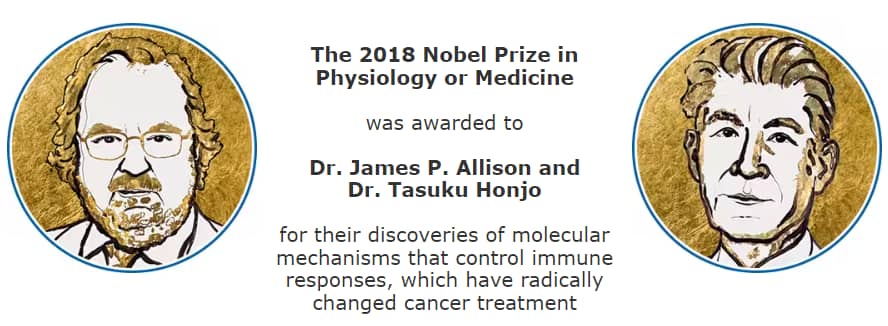
Images courtesy of Nobel Prize
Each investigator independently discovered immunological checkpoint mechanisms, which could be targeted for inhibition, allowing T-cells to attack cancer cells.
Dr. Allison’s research in the 1990s at the University of California, Berkeley, uncovered the immunological checkpoint controlled by CTLA-4. He discovered that inhibition of this T cell checkpoint mechanism, via an antibody targeting CTLA-4 in mice, led to tumor burden reduction and elimination. His work supported the development of ipilimumab, which was approved for clinical use by the FDA in 2011 for the treatment of melanoma.
In 1992, Dr. Honjo discovered the immunological checkpoint controlled by PD-1. His work elucidated that this surface protein, expressed by T and pro-B cells, was necessary to prevent autoimmunity in animal models. Drugs targeting PD-1 have been approved since 2015 for various types of cancer including melanoma, gastric and non-small-cell lung cancer.
Independently, the discoveries by these scientists defied dogma and opened the doors to previously unthinkable treatments for cancer.
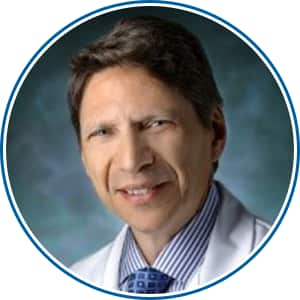
Dr. Drew M. Pardoll, MD., PhD.
Director, Bloomberg-Kimmel Institute for Cancer Immunotherapy, Johns Hopkins Medicine
"For those of us who have worked for decades to empower patients' immune systems to attack their cancer, we are thrilled at the awarding of the 2018 Nobel Prizes to two pioneers whose basic scientific discoveries led directly to the development of immunotherapies that are curing more than 13 different types of advanced solid cancer. This Prize represents a great victory for our field and for cancer patients."
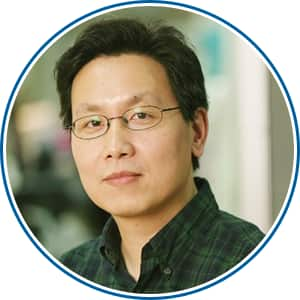
Dr. Xingxing Zang, M.Med, PhD.
Professor and Louis Goldstein Swan Chair in Cancer Research, Department of Microbiology and Immunology, Albert Einstein College of Medicine
“This is a truly well-deserved honor for Drs. James P. Allison and Tasuku Honjo. The immune system has many brakes, immune checkpoints, which down-regulate T cell activation and function. Jim’s original idea and experiment that the temporary relief of immune checkpoints, particularly CTLA-4, could mobilize the immune system to attack tumors finally led to a new type of cancer therapy: immune checkpoint blockade and the first anti-CTLA-4 drug ipilimumab. Honjo identified PD-1 as another important immune checkpoint and several anti-PD-1 drugs have been approved for the treatment of several types of cancer. This award is also a testament that the fundamental research can be translated into clinical treatment.”
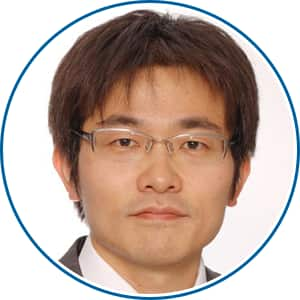
Dr. Kenji Chamoto, PhD.
Associate Professor, Department of Immunology and Genomic Medicine, Dr. Honjo’s Lab, Kyoto University
“We are very proud of Dr. Honjo’s Nobel prize as a senior member of his lab. Although cancer immunotherapy had not been long paid attention to, immune checkpoint inhibitors have opened the door of cancer immunotherapy. Most important point is that immune surveillance for cancer exactly exist and this novel notion would change the strategy of other cancer therapies including chemotherapy and radiation therapy. There are already so many clinical trials for combination therapy with the PD-1 and/or CTLA-4 blockade for cancer immunotherapy, and therefore the efficacy has been increasing. We hope the day will come soon where we can say “cancer is not a deadly disease, but just a chronic immune disease”.
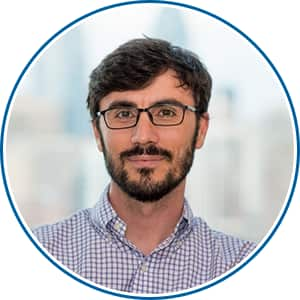
Dr. Marco Ruella, MD.
Assistant Professor, Hematology-Oncology, University of Pennsylvania
“The pioneering studies from Dr. Allison and Dr. Honjo were crucial to demonstrate to the scientific community that the immune system can be successfully redirected against cancer and cure patients with refractory cancer. We are all thankful to them and take inspiration from their work.”
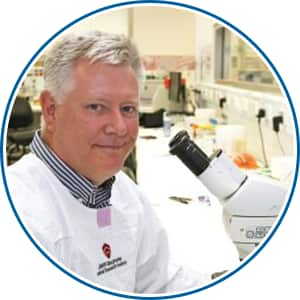
Dr. Mark Smyth, PhD.
Senior Scientist, Immunology in Cancer and Infection Laboratory, QIMR Berghofer Medical Research Institute
“From the Australian immunology and translational research community, our heartfelt thanks for all that Dr’s Allison and Honjo have done to advance the field of cancer immunotherapy and to save the lives of many cancer patients.”
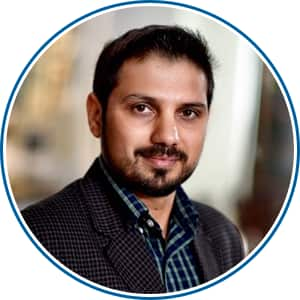
Dr. Naveen Sharma, PhD.
Instructor, Department of Immunology, Dr. Allison’s Lab, MD Anderson Cancer Center
“I am extremely delighted that Dr. James P. Allison and Dr. Tasuku Honjo won this year’s Nobel prize for medicine. Their contributions are so important and seminal that we, in the field, have been waiting a few years now for them to win this prize. T cells of the immune system would normally kill mutated tumor cells, but in the tumor microenvironment these cells are suppressed by the engagement of inhibitory receptors expressed on T cells with their ligands. One way to prevent this suppression or remove these breaks on T cells, is by disengaging this interaction, by administrating blocking antibodies against these receptors. In the 90s, Dr. Allison’s ground-breaking work discovered the first of these inhibitory signals (CTLA-4), also now known as checkpoints, and showed that CTLA-4 as an inhibitory signal limits anti-tumor responses. He showed that administrating blocking antibodies against this receptor can remove the break on T cells and potentiate effective immune responses against tumor cells. This discovery paved the way for a new class of drugs that have changed the outcomes for cancer patients dramatically.
Dr. Honjo independently discovered another checkpoint molecule called PD-1 and showed that this is an inducible gene on activated T cells. He demonstrated that PD-1 is a negative regulator of immune responses by showing that PD-1 inhibits T cell activation by binding to its ligand, and PD-1 deficient mice develop autoimmune diseases. Anti-PD1 antibodies which are developed on the basis of his work have produced improvements to patients in the clinic.
I, especially, feel proud for this moment as I have been lucky to be working with Dr. Allison and have him as my mentor. He is a very humble person and a great mentor who inspires us with his passion and enthusiasm for basic science, but still not ignoring the translational application of scientific discoveries.”

Dr. Faraz Haque, PhD.
Postdoctoral Fellow, Honjo’s Lab, Department of Immunology and Genomic Medicine, Kyoto University
“For more than 10 decades, scientists attempted to fight against cancer through the immune system. Until the seminal discoveries by the two Laureates, progress into clinical development was modest. The Nobel Laureates Prof. T. Honjo and Prof. Allison deserve this prize for introducing a new concept, which added important footsteps in the field of cancer immunotherapy. The discovery of the key molecules like PD1 and CTL4 revolutionized immunotherapy and gives us hope to combat and completely eliminate cancer in the near future. I am extremely delighted to be a part of Prof T. Honjo’s team and wish to contribute more to the next era of cancer immunotherapy.”